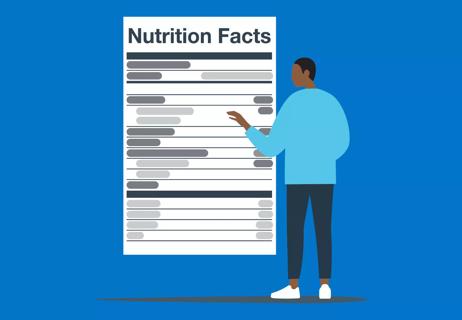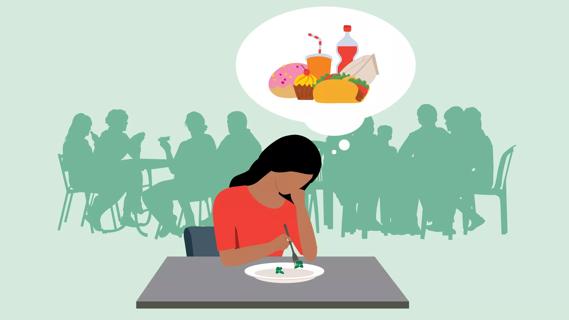Advertisement
Learning about your relationship with food can help improve your eating behaviors and patterns

You’ve just eaten too much pizza and too many wings. And now, you’re beating yourself up for overeating and not making the smartest food decisions. We’ve all been there.
Advertisement
Cleveland Clinic is a non-profit academic medical center. Advertising on our site helps support our mission. We do not endorse non-Cleveland Clinic products or services. Policy
It can be easy to get into a habit of self-blame, shame, guilt and regret. But it’s important that you understand your relationship with food: The how and why of what we eat.
Learning more about food psychology can help change how you view food and provide you with a set of tools and tips to improve your relationship with food.
Psychologist Susan Albers, PsyD, explains the role that psychology plays when it comes to food, eating, weight management and mental health.
What we eat affects how we feel. Food should make us feel good. It tastes great and nourishes our bodies. But if you eat too little or eat too much, your health and quality of life could be affected. This can result in negative feelings toward food.
“By learning how to make healthier and more mindful choices, you may be able to manage compulsive eating, binging and weight gain,” explains Dr. Albers. “By taking charge of your appetite, you may also gain a feeling of calm, high energy levels and alertness from the foods you eat.”
Overall, there are many benefits to changing engrained, unhealthy eating habits, such as:
While we often have the best intentions to eat healthier, this is often a challenging task.
Dr. Albers says many factors can influence our feelings about food and our eating behaviors.
These factors include:
“Many people use food as a coping mechanism to deal with such feelings as stress, boredom or anxiety, or even to prolong feelings of joy,” says Dr. Albers. “While this may help in the short term, eating to soothe and ease your feelings often leads to regret and guilt, and can even increase negative feelings. You aren’t actually coping with the problem causing the stress.”
Additionally, your self-image may suffer as you gain or lose weight, or you may experience other undesired effects on your health, such as elevated blood sugars, cholesterol levels or blood pressure.
Psychology is the science of behavior. It’s the study of how and why people do what they do. For people trying to manage their weight, psychology addresses:
Advertisement
Cognitive behavioral treatment is the approach most often used because it deals with both thinking patterns and behavior. Some areas that are addressed through cognitive behavioral treatment include:
Cognitive therapy addresses how you think about food. It helps you recognize self-defeating patterns of thinking that can undermine your success at eating healthier and managing your weight. It also helps you learn and practice using positive coping self-statements.
Examples of self-defeating thoughts include:
Examples of positive coping self-statements include:
To improve your relationship with food and your body, it’s helpful to change your thinking. Weight management is about making a lifestyle change. But it’s not going to happen if you rely on short-term diet after diet to lose weight.
To be successful, be aware of the role that eating plays in your life and learn how to use positive thinking and behavioral coping strategies to manage your eating and weight.
To help get you started, here are a few tips:
Advertisement
Knowledge is power. And learning more about the food choices you make and how they make you feel can lead to smarter choices and decisions over time.
“Focusing on how and why you eat is just as important as what you eat,” stresses Dr. Albers. “By being mindful of your habits and relationship with food, you can empower yourself and reveal the way to eat that is truly nourishing to your body and mind.”
Advertisement
Learn more about our editorial process.
Advertisement

A variety of healthy foods can help reduce inflammation and keep other conditions at bay

Information on serving size, calories and nutrients can help you make healthy choices

The general rule is 0.8 to 1 gram of protein per kilogram of body weight — but that may not be right for you, and it’s important to determine what’s right for you

Adding salt to your water isn’t going to have measurable benefits — but there may be plenty of downsides

Pickles are low in fat and calories and rich in some vitamins and minerals, but they’re usually high in sodium

With a sweet, tangy flavor, this tropical fruit is super versatile and high in antioxidants

A change in diet won’t cure COPD — but getting to or maintaining a healthy weight will help

Having overweight and disordered eating is a high-risk combination that often gets dismissed or overlooked

Focus on your body’s metabolic set point by eating healthy foods, making exercise a part of your routine and reducing stress

PFAS chemicals may make life easier — but they aren’t always so easy on the human body

While there’s little risk in trying this hair care treatment, there isn’t much science to back up the claims